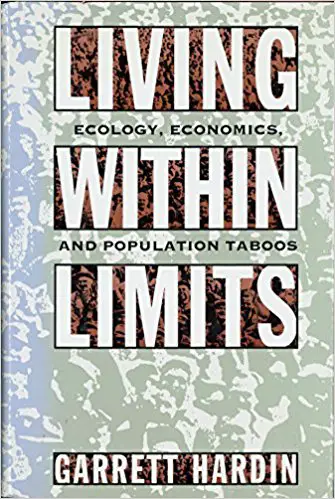We hope you love the books people recommend! Just so you know, The CEO Library may collect a share of sales or other compensation from the links on this page.
This book has 1 recommendation
Charlie Munger (Vice Chairman/Berkshire Hathaway)
It is a summary of the major things Hardin has learned in a lifetime. He is a real thinker. That is a fabulous book [...] I advise you to read it twice (which I did)... because it is the condensed wisdom of a very smart man.Amazon description
"We fail to mandate economic sanity," writes Garrett Hardin, "because our brains are addled by...compassion." With such startling assertions, Hardin has cut a swathe through the field of ecology for decades, winning a reputation as a fearless and original thinker. A prominent biologist, ecological philosopher, and keen student of human population control, Hardin now offers the finest summation of his work to date, with an eloquent argument for accepting the limits of the earth's resources--and the hard choices we must make to live within them.
In Living Within Limits, Hardin focuses on the neglected problem of overpopulation, making a forceful case for dramatically changing the way we live in and manage our world. Our world itself, he writes, is in the dilemma of the lifeboat: it can only hold a certain number of people before it sinks--not everyone can be saved. The old idea of progress and limitless growth misses the point that the earth (and each part of it) has a limited carrying capacity; sentimentality should not cloud our ability to take necessary steps to limit population. But Hardin refutes the notion that goodwill and voluntary restraints will be enough. Instead, nations where population is growing must suffer the consequences alone. Too often, he writes, we operate on the faulty principle of shared costs matched with private profits. In Hardin's famous essay, "The Tragedy of the Commons," he showed how a village common pasture suffers from overgrazing because each villager puts as many cattle on it as possible--since the costs of grazing are shared by everyone, but the profits go to the individual.
The metaphor applies to global ecology, he argues, making a powerful case for closed borders and an end to immigration from poor nations to rich ones. "The production of human beings is the result of very localized human actions; corrective action must be local....Globalizing the 'population problem' would only ensure that it would never be solved." Hardin does not shrink from the startling implications of his argument, as he criticizes the shipment of food to overpopulated regions and asserts that coercion in population control is inevitable. But he also proposes a free flow of information across boundaries, to allow each state to help itself.
Get this book on Amazon | Barnes & Noble | Book Depository | iBooks




